英语听力lesson1到5课的听力原文
新概念英语第二册听力原文

★新概念英语频道为⼤家整理的新概念英语第⼆册听⼒原⽂,供⼤家阅读参考。
更多阅读请查看本站频道。
Lesson 1 A private conversation 课⽂内容: Last week I went to the theatre. I had a very good seat. The play was very interesting. I did not enjoy it. A young man and a young woman were sitting behind me. They were talking loudly. I got very angry. I could not hear the actors. I turned round.I looked at the man and the woman angrily. They did not pay any attention. In the end, I could not bear it. I turned round again. ‘I can't hear a word!’ I said angrily. ‘It's none of your business, ’ the young man said rudely. ‘This is a private conversation!’ Notes on the text 课⽂注释 1 go to the theatre,去看戏。
2 got angry,⽣⽓。
3 turn round,转⾝,也可⽤turn around。
4 pay attention,注意。
5 I could not bear it.我⽆法忍受。
其中的it是指上⽂中的那对男⼥⼤声说话⼜不理会作者的愤怒⽬光。
6 none of your business,不关你的事。
参考译⽂: 上星期我去看戏。
人教新起点二年级上学期英语听力原文材料
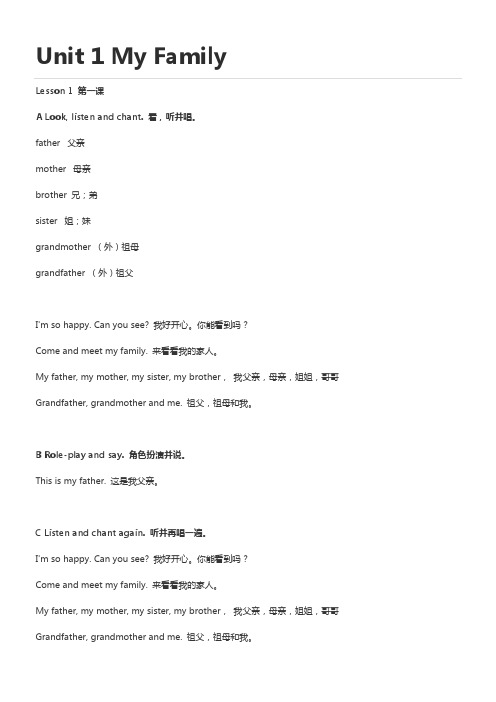
Unit 1 My FamilyLesson 1 第一课A Look, listen and chant. 看,听并唱。
father 父亲mother 母亲brother 兄;弟sister 姐;妹grandmother (外)祖母grandfather (外)祖父I'm so happy. Can you see? 我好开心。
你能看到吗?Come and meet my family. 来看看我的家人。
My father, my mother, my sister, my brother,我父亲,母亲,姐姐,哥哥Grandfather, grandmother and me. 祖父,祖母和我。
B Role-play and say. 角色扮演并说。
This is my father. 这是我父亲。
C Listen and chant again. 听并再唱一遍。
I'm so happy. Can you see? 我好开心。
你能看到吗?Come and meet my family. 来看看我的家人。
My father, my mother, my sister, my brother,我父亲,母亲,姐姐,哥哥Grandfather, grandmother and me. 祖父,祖母和我。
Lesson 2 第二课A Look, listen and repeat. 看,听并重复。
Who's he? 他是谁?He is my father. 他是我父亲。
Who's she? 她是谁?She is my mother. 她是我母亲。
B Show and say. 表现并说。
Who's he? 他是谁?He is my grandfather. 他是我祖父。
Who's she? 她是谁?She is my mother. 她是我母亲。
Unit 2 Lesson 1 Lesson 1 第一课A Look, listen and chant. 看,听和唱。
英语初级听力原文(listen to this1)1课

Student 1: Not really. My parents are fairly(相当) well off(富裕的) so I get an allowance(津贴 补助) from my father.
Reporter: You're lucky, aren't you?
Student 1: I suppose so.
Reporter: What about you? Are your parents wealthy?
Student 2: No, certainly not.
Reporter: Do you work during the holidays?
Student 2: Well, last Christmas I did two weeks as temporary(临时的) postman, then in the summer I spent four weeks fruit picking, and I do a bit of baby-sitting, so I manage.
Full stop 句号
Comma 逗号
—I'm an accountant.(会计)
—Oh! Do you enjoy it?
—No. I don't really like it. It's boring.
3—Where do you come from?
—Indonesia.(印度尼西亚)
—Oh! Which part?
—Jakarta.(雅加达)
—Really?
4—Can you speak German?
—Yes, I can. I speak it very well.
人教新起点六年级上学期英语听力原文材料
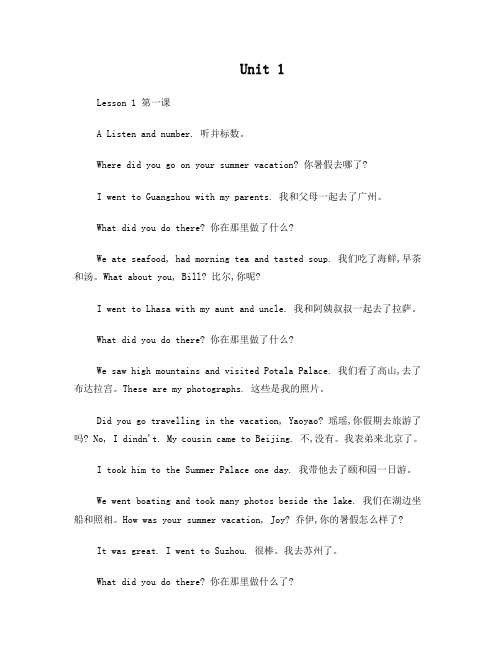
Unit 1Lesson 1 第一课A Listen and number. 听并标数。
Where did you go on your summer vacation? 你暑假去哪了?I went to Guangzhou with my parents. 我和父母一起去了广州。
What did you do there? 你在那里做了什么?We ate seafood, had morning tea and tasted soup. 我们吃了海鲜,早茶和汤。
What about you, Bill? 比尔,你呢?I went to Lhasa with my aunt and uncle. 我和阿姨叔叔一起去了拉萨。
What did you do there? 你在那里做了什么?We saw high mountains and visited Potala Palace. 我们看了高山,去了布达拉宫。
These are my photographs. 这些是我的照片。
Did you go travelling in the vacation, Yaoyao? 瑶瑶,你假期去旅游了吗? No, I dindn't. My cousin came to Beijing. 不,没有。
我表弟来北京了。
I took him to the Summer Palace one day. 我带他去了颐和园一日游。
We went boating and took many photos beside the lake. 我们在湖边坐船和照相。
How was your summer vacation, Joy? 乔伊,你的暑假怎么样了?It was great. I went to Suzhou. 很棒。
我去苏州了。
What did you do there? 你在那里做什么了?I visited some gardens there. 我看了很多园林。
人教版新起点三年级下学期英语听力原文材料
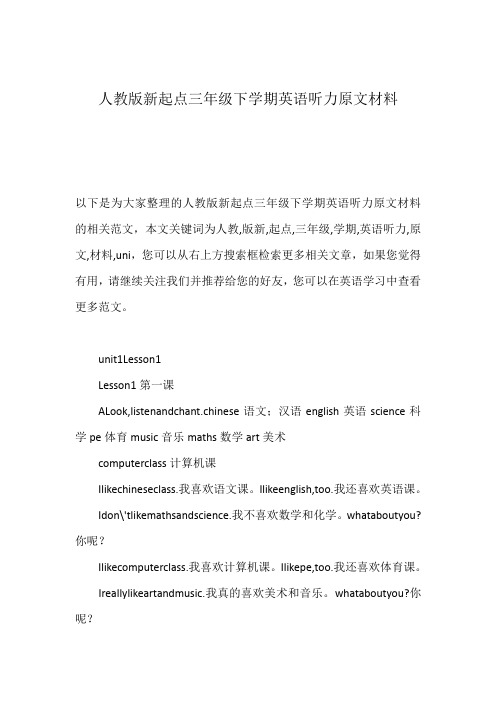
人教版新起点三年级下学期英语听力原文材料以下是为大家整理的人教版新起点三年级下学期英语听力原文材料的相关范文,本文关键词为人教,版新,起点,三年级,学期,英语听力,原文,材料,uni,您可以从右上方搜索框检索更多相关文章,如果您觉得有用,请继续关注我们并推荐给您的好友,您可以在英语学习中查看更多范文。
unit1Lesson1Lesson1第一课ALook,listenandchant.chinese语文;汉语english英语science科学pe体育music音乐maths数学art美术computerclass计算机课Ilikechineseclass.我喜欢语文课。
Ilikeenglish,too.我还喜欢英语课。
Idon\'tlikemathsandscience.我不喜欢数学和化学。
whataboutyou?你呢?Ilikecomputerclass.我喜欢计算机课。
Ilikepe,too.我还喜欢体育课。
Ireallylikeartandmusic.我真的喜欢美术和音乐。
whataboutyou?你呢?bAskandanswer.问和答。
bill,doyoulikecomputerclass?比尔,你喜欢计算机课吗?Yes,Ido.是的,我喜欢。
Doyoulikeart?你喜欢美术吗?no,Idon\'t.不,我不喜欢。
Lesson2第二课ALook,listenandrepeat.看,听并重复。
grandpa:whatclassesdoyouhaveonmonday?你们周一有什么课?sally:wehaveenglshandmusic.我们有英语和音乐。
sam:wehavemaths,peandcomputerclass.我们有数学、体育和计算机课。
sally:Doyoulikepe?你喜欢体育吗?sam:Yes,Ido.Doyoulikepe?是的,我喜欢。
你喜欢体育吗?sally:no,Idon\'t.Ilikemusic.不,我不喜欢。
人教新起点六年级下学期英语听力原文材料
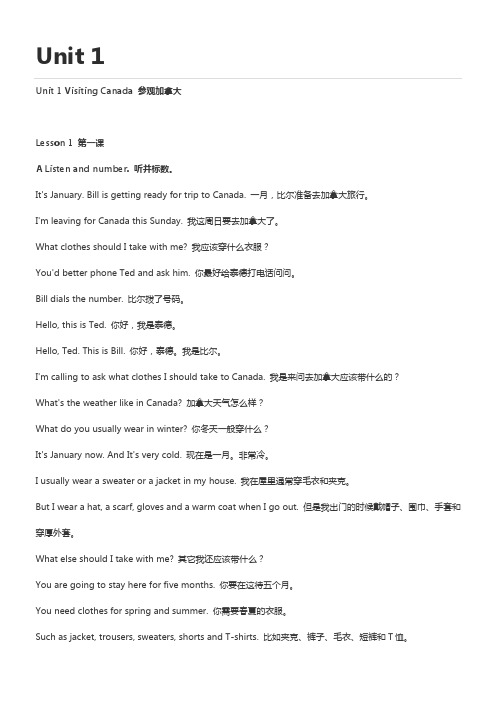
Unit 1Unit 1 Visiting Canada 参观加拿大Lesson 1 第一课A Listen and number. 听并标数。
It's January. Bill is getting ready for trip to Canada. 一月,比尔准备去加拿大旅行。
I'm leaving for Canada this Sunday. 我这周日要去加拿大了。
What clothes should I take with me? 我应该穿什么衣服?You'd better phone Ted and ask him. 你最好给泰德打电话问问。
Bill dials the number. 比尔拨了号码。
Hello, this is Ted. 你好,我是泰德。
Hello, Ted. This is Bill. 你好,泰德。
我是比尔。
I'm calling to ask what clothes I should take to Canada. 我是来问去加拿大应该带什么的?What's the weather like in Canada? 加拿大天气怎么样?What do you usually wear in winter? 你冬天一般穿什么?It's January now. And It's very cold. 现在是一月。
非常冷。
I usually wear a sweater or a jacket in my house. 我在屋里通常穿毛衣和夹克。
But I wear a hat, a scarf, gloves and a warm coat when I go out. 但是我出门的时候戴帽子、围巾、手套和穿厚外套。
What else should I take with me? 其它我还应该带什么?You are going to stay here for five months. 你要在这待五个月。
人教版新起点五年级上学期英语听力原文材料

人教版新起点五年级上学期英语听力原文材料unit1classmateslesson1第一课alistenandmatch.听到并相匹配。
lookatthesepictures.看一看这些图片。
thesearemynewfriends.这些就是我的新朋友。
whoisshe?她就是谁?hernameishelen.她的名字是海伦。
shelikesreading.她喜欢读书。
sheispoliteandquiet.她很存有礼貌很安静。
whoishe?他就是谁?heispeter.他就是彼得。
heisverypopularinourschool.他在我们学校很受欢迎。
helikesplayingbasketball.他喜欢打篮球。
andheisveryactiveinclassandinoursingingclub,too.他在我们班级和我们歌唱社很活跃。
thatgirllooksveryfriendly.那个女孩非常平易近人。
that'smary.那就是玛丽。
yes,she'salwaysfriendlyandveryhelpful.是的,她总是很亲切很乐于助人。
herhobbyisdancing.她的爱好是跳舞。
wow,thathobbyissocute.哇,那个嗜好不好调皮。
that'stom'sjobs.那就是汤姆的工作。
tomiscleverandgoodatmaths.汤姆很聪明,擅长数学。
butsometimesheiscarelessandheforgettofeedhisdog.但是有时他很贪玩忘掉给狗狗进食。
oh,thepoordog.哦,可怜的狗狗。
lesson2第二课alook,listenandanswer.看看,听到并提问。
(tomisbill'snewfriend.billtakesyaoyaototom'sbirthdayparty.)(汤姆是比尔的新朋友。
人教新起点三年级上学期英语听力原文材料

人教新起点三年级上学期英语听力原文材料-CAL-FENGHAI.-(YICAI)-Company One1Unit 1 MyselfLesson 1 第一课A Look, listen and chant. 看,听和唱。
My name is Sue. 我叫苏。
I'm new here. 我是新来的。
I'm nine years old. 我今年九岁了。
I want to be your friend. 我想和你们做朋友。
name 名字new friend 新朋友nine years old 九岁Hello, you're new. 你好,你是新来的。
What's your name 你叫什么名字And how old are you 几岁了Hello. I'm new. 你好。
我是新来的。
My name's Sue. 我叫苏。
And I'm 9 years old. 九岁了。
B Let's role-play. 角色扮演。
Hello.My name is Sue. 你好。
我名叫苏。
I'm new here. 我是新来的。
I'm nine years old. 我九岁了。
I want to be your friend. 我想和你做朋友。
Hello. My name is Jack. 你好。
我名叫杰克。
I'm eight years old. 我八岁了。
I want to be your frend, too. 我也想和你做朋友。
Lesson 2 第二课A Look, listen and repeat. 看,听和重复。
Bill: What's your name 你叫什么Sue: I'm Sue. 我叫苏。
Bill: How old are you 你今年几岁Su: I'm nine years old. 我九岁了。
(完整word版)人教新起点五年级上学期英语听力原文材料
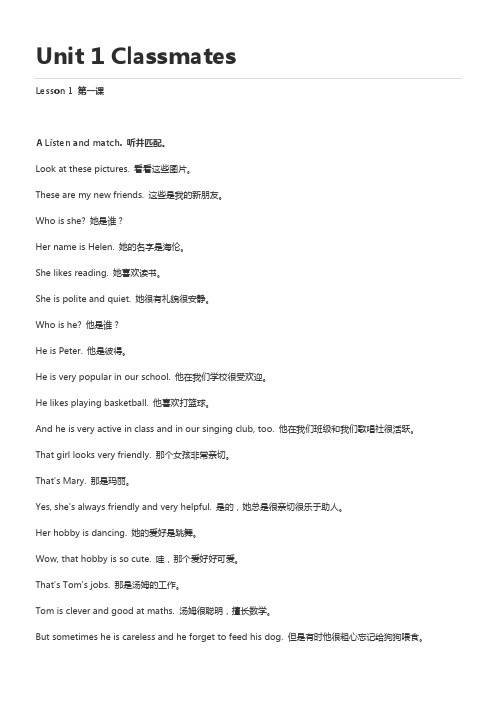
Unit 1 ClassmatesLesson 1 第一课A Listen and match. 听并匹配。
Look at these pictures. 看看这些图片。
These are my new friends. 这些是我的新朋友。
Who is she? 她是谁?Her name is Helen. 她的名字是海伦。
She likes reading. 她喜欢读书。
She is polite and quiet. 她很有礼貌很安静。
Who is he? 他是谁?He is Peter. 他是彼得。
He is very popular in our school. 他在我们学校很受欢迎。
He likes playing basketball. 他喜欢打篮球。
And he is very active in class and in our singing club, too. 他在我们班级和我们歌唱社很活跃。
That girl looks very friendly. 那个女孩非常亲切。
That's Mary. 那是玛丽。
Yes, she's always friendly and very helpful. 是的,她总是很亲切很乐于助人。
Her hobby is dancing. 她的爱好是跳舞。
Wow, that hobby is so cute. 哇,那个爱好好可爱。
That's Tom's jobs. 那是汤姆的工作。
Tom is clever and good at maths. 汤姆很聪明,擅长数学。
Oh, the poor dog. 哦,可怜的狗狗。
Lesson 2 第二课A Look, listen and answer. 看,听并回答。
(Tom is Bill's new friend. Bill takes Yaoyao to Tom's birthday party.) (汤姆是比尔的新朋友。
大学英语听力5原文1--5课
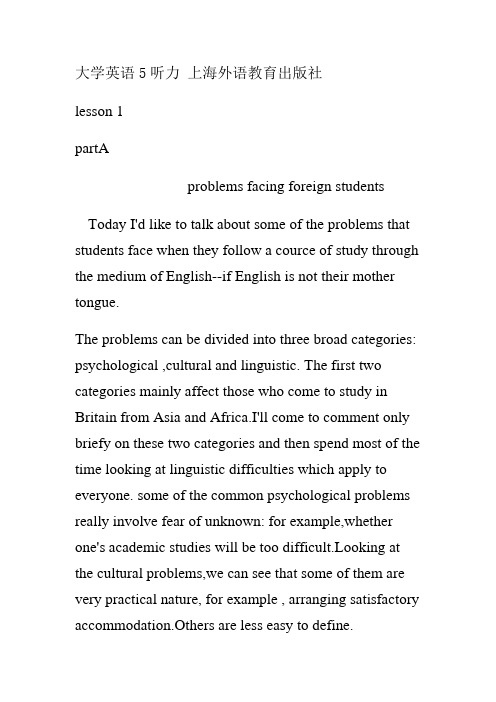
大学英语5听力上海外语教育出版社lesson 1partAproblems facing foreign studentsToday I'd like to talk about some of the problems that students face when they follow a cource of study through the medium of English--if English is not their mother tongue.The problems can be divided into three broad categories: psychological ,cultural and linguistic. The first two categories mainly affect those who come to study in Britain from Asia and Africa.I'll come to comment only briefy on these two categories and then spend most of the time looking at linguistic difficulties which apply to everyone. some of the common psychological problems really involve fear of unknown: for example,whether one's academic studies will be too difficult.Looking at the cultural problems,we can see that some of them are very practical nature, for example , arranging satisfactory accommodation.Others are less easy to define.The largest category seems to be linguistic. let's look at this in some details.Most students,in their own countries,will have little opportunity to practise using English.Where foreign learners first have the opportunity to speak to an English-speaking person then may have a shock"they often have great difficulty in understanding!I'll just mention three of the possible reasons for this.First, it seems to students that English people speak very quickly . Second,they speak with a variety of accents.Third, different styles of speech are used.For all of these reasons students will have difficulty,mainly because they lack everyday practice in listening to English people speaking English.What can a student do then to overcome these difficulties?Obviously,attend English class and, if a language laboratory is available,use it as much as possible.He should also listen to programs in English on the radio and TV.Perhaps most important of all,he should take every opportunity to meet and speak with native English-speaking people.In addition,the student probably has difficulty in speaking English fluently.The advice here will seem difficult to follow but it's necessary.Firstly, he must simplify what he wants to say so that he can express himself reasonably clearly.Secondly,he must try to think in English, not translate from his mother tongue.This will begin to take place only when his use of English becomes ing a language laboratory and listening to English as mush as possible will help.I:question:1.what does the lecture mainly disscuss? [d]2.what kind of students is the speaker referring to? [b ]3. why do students have difficulties in understanding English speech?[a]4.how,according to the speaker, can foreign students learn to speak English fluently?[b]5.which of the followong statements can be inferes from the passage?[c]Part CAt the age of 64 and having only a 1937 diploma from an apprentice training school,I decided to enroll in an new weekend college program at Findley College in Ohio-now the University of Findley. The result is I was granted dual B.A.diploma in 1985 at the age of 69.My degrees are in business adminstration and information systems analysis, which means computers.My 'excuse' for going to college at that age was to find what i did right in business for 33 years.The second reason was to prove to myself that i was an 'A'student-which i accomplished by making the dean's list the second semester.Because the dean of the college knew that i expected to be treated like any other student. we both laughed about the professor who rushed into the dean's office and explained,'i have a trustee of the college in my class! what do i do?' when the dean told me about it, my response was,'i hope you told him to fail me if i didn't do the work.' the dean replied,'that is exactly what i told him.'the dean's list : 学院院长公布的优秀学生名单trustee:董事question: 1. when did the speaker receive his diplomas?[a]2.the speaker received two B.A.degrees after a five-year study at a college. what subjects are these degrees in?[d]3.what was one of the reasons why the speaker went to college?[c]4.why did the professor feel so nervous when he found the speaker sitting in his class as one of his students?[b]5.what is the main lesson to be drawn from the passage?[b]Lesson2PART AAmerican Marriage CustomsPeople in the U.S.,when they attain legal age and meet certain medical requirements,are free to choose their own mates. Once a couple has decided to get married, the mancustomarily gives the girl a diamond ring. The use of ring comes from the ancient custom of using a ring to settle an important agreement. When the wedding day is decided upon, the girl sends out wedding announcements or friends and relatives. The then send wedding gifts to the girl’s home.On the wedding day it is supposed to be bad luck for the bride and groom to see each other before the wedding. Another ole custom that people believe will bring good luck to the marriage is for the bride to wear’ something old, something new, something borrowed, and something blue’.Before the wedding day the groom always chooses a ‘best man’, a good friend to help him and stand beside him during the wedding ceremony.the custom of having a’best man’is thought to have come from ancent times when a strong friend helped the groom escape from the bride’s father.When a couple marries, the groom gives his bride a wedding ring. Many marriages are double ring ceremonies ---that is, the bride and thegroom exchange rings. The wedding ring is customarily a simple plain gold band. The roundness of the ring symbolizes eternity and announces that the couple is united for life. The wedding ring is worn on the third finger of the left hand. People believe that a vein from the third finger runs directly to the heart.Near the end of the recepition, which is offered by the brid e’s the parents,the bride throws her bouquet flowers to the unwed bridemaids. The luckly girl who catches it is supposed to be the next in the group to the married. As the bride and the groom leave for their honeymoon, the guests all throw confetti on them. This id a symbol of joy and happiness.I答案1-5c b a c c II 答案“FFFFTPART CIn many homes, divorce is caused by the‘battle between the sexes’.to understand the problem, one must remember the mordern American woman is freed. During childhood and adolescence, the American girl is given freedom and educationwhich is equal to a boy’s. after completing school, she is able to get a job and support herself. She doesn’t have to marry for finanical security. She considers herself an independent, self-sufficient person. She wants a husband whom she can respect, but she doesn’t want to be dominated by him. She want a democratic household in which she has a voice in making decisions. When a husband and wife are able to share decision making, their marriage is probably closer, stronger, and more satisfying. Otherwise, the couple is likely to wind up in the divorce court.When a couple gets divorced, the court usually requires the man to pay his former wife a monthly sum of money. If the couple has children,they usually remain with the mother, and the father is expected to pay for their support.Although divorced is quite common in the united states,80 percent of those who get divorced remarry. The remarriages allow thousands of people, especially children, to enjoy family life again, but at the same time many troubles have arisen. A well-known American joke tells of a wife calling to her second husand,‘Quick, John! Come here and help me! Your children and my children are beating up our children!’答案:1-5dbcbdLesson 3PART A Telephone message for Mr Drawson9:00Amanda Mr Dawson's office.Jenny oh,it's Jenny . can you give Mr Dawson a message? I won't be in till Friday. I've got the flu. I saw the doctor this morning.Amanda OK, jenny. I'll pass the massage on. I hope you'll feel better soon,9:40Amanda Mr Dawson's office. can i help you ?Mr Watkins may i speak to Mr Dawson's ,please?Amanda I'm afaid he's away in business. he'll be back tomorrow. can i take a message?Mr Watkins Please. it's Tom Datkins here. look. i can't make the meeting on Tuesday afternoon. something important's come up. i'll ring Peter on Wednessday.11:30Amanda hello, godfrey. what can i do for you?Godfrey Mr Dawson isn't here, is he?Amanda No, not till tomorrow.Godfrey Ah ... it's just that i want friday off. you see. my grandmother died yesterday. i'll have to go to the funeral.Amanda Oh, i am sorry. how old was she?Godfrey 92.12:15Amanda Mr Dawson's office.Salesman can you put me to through to Mr Dawson?Amanda I'm afraid he isn't here today. would you like to leave a message?Salesman Oh, right, wadley's garage here. it's about his new car. it isn't ready yet. there's a strike at he factory today.2:10Amanda Good afternoon. Mr Dawson's office.Miss Dobson Good afternoon. this is Juliet Dobson from western Video Syetems. Mr Dawson's at the trade fair in Lyon, isn't he?Amanda yes. that's right. he should be here tomorrow.Miss Dobson well, cam you give him this message first thing in the morning? I'm afraid we must cancel our last order. the customers have changed their minds again!3:20Amanda Good afternoon. Mr Dawson's office.Mr Gonzalez hello, this is Miguel Gonzalez speaking. is Peter there?Amanda No,i'm afraid he's away on business today. can i pass on a message .Senor Gonzalez?Mr Gonzalez yes, i may be in London from 21st to 25st. i want to see Peter then, if possible. it's about the agency in Mexico.4:35Amanda Mr Dawson's office.Mrs Ellis My name's Samantha Ellis. can you get Mr Dawson to phone me as soon as he gets back from Lyon? it really is very urgent.4:55Amanda Mr Dawson's office.Mr Berry Ah, Miss Hayward. this is Charles Berry.Amanda Oh, good afternoon, sir.Mr Berry I've got an important message for Mr Dawson. give it to him the minute he comes in. just say, 'Don't supply Mason and Company until further notice'. I'll explain later.(It's Tuesday morning.Peter Dawson has returned to the office after his business trip to Lyon.)Peter Good morning, Amanda. could you come in for a minute, please?Amanda Good morning , Mr Dawson. did you have a good trip?Peter Yes, thank you. were there any messages for me yesterday?Amanda yes, quite a few. shall i just run through them?Peter please.Amanda Jenny phoned. she said she would be in till Friday.Peter Oh, why's that?Amanda she said she had the flu. she'd seen the doctor.Peter Right, go on.Amanda Then Mr Watkins called, he said he couldn't make the meeting this afternoon but would ring you on Wednesday.Peter OK.Amanda Godfrey came in looking for you. he said he wanted Friday off.Peter Did he?Amanda yes, he told me his grandmother had died and he'd have to go to the funeral.Peter Oh, dear. I'd better see him later.Amanda And Wadley's Garage called. they said you new car wasn't ready.Peter Oh,no... why on earth not?Amanda they said there was a strike at the factory yesterday.Peter Again!Amanda After lunch Miss Dobson phoned. she said that Western Video Systems had to cancel their last order because their customers had changed their minds.Peter Pity!Amanda Mr Gonzalez called from Mexico to say he might be in London from 21st to 25th. he said he wanted to see you then.Peter Oh, good. I hope he can make it.Amanda then a lady phoned, Samantha,Ellis. she asked you to phone her as soon as possible. she said it was urgent.Peter Ah, Samantha. i wonder what she wants.Amanda Oh and just before five. Mr Berry phoned . he told us not to supply Mason&Co.until further notice. he said it was important and that he would explain later.Peter Anything else?Amanda No, that's it. Coffee?Peter Please,, that would be nice.答案 1-5 cbccdPART CThe United States is a telephone land. Almost everyone uses the telephone to make or break social engagements, to say their 'thank you's', to do their shopping and ordering (even from food and drug stores),and to obtain all kinds of information. telephones are save you feet and endless amounts of time----not to mention multiple bus or subway fares!Different countries put their telephones in different places. in the U.S they are so widespread that you will find them in buses and air terminals, rainroad stations, stores, hotels, the lobbies of many office buildings, restaurants and in small booths along streets and highways.It is simple and quick to have a private phone installed. you just call the telephone company and they will come to install it on a special day by appointment, when it is convenient for you. you fill out a form and pay a deposit of some 40 dollars for the phone and, if you are formally employed, you may even be freed from this fee.答案:1-5 dbbac大学英语精读5听力原文 LESSON42009-03-17 21:48PART A Dr Coleman's Sabbatical LeaveIn the United States a university professor isgranted a few months of freedom from his duties approximatelyevery seventh year for travel or advanced study. this period offreedom from teaching is called a 'sabbatical leave'.Few sabbatical leaves are interesting enough to bedescribed in national newspapers and magazines. recently,however, there was an exception. the public learned how Dr JohnR.Coleman, president of Haverford College. had spent hissabbatical leave.At the age of 51 Dr Coleman was determined to escape fromuniversity life for a few months and to get a variety ofexperiences in the world of work.he especially wanted to learn about people. people who do hard physical labor were particularly interesting to him.Telling no one of his plans. Dr Coleman started his sabbatical leave on a farm in Canada, hundreds of miles from his college. Getting up at 4:30 each morning, working thirteen hours a day in fields and barns, he prepared himself physically for his next job, digging ditches, in Atlanta, Georgia, after that, the college president washed dishes in a boston restaurant, during the last ten days of his leave, he worked as a garbage collector.This unusual sabbatical leave was conducted in great secrecy. Coleman telephoned his family once a week,'just to let some know where i was and that i was healthy.' none of his students or co-workers at Haverford College knew what their president was doing. on each job he avoided letting people know who he was. 'when people would ask me about myself, i'd try to turn the conversation back to them,' he explained. 'some co-workers might have thought i was a little different, a little quiet maybe, but i doubt anyone knew i was a college president.'there was only one employer who sensed somethingunusual. 'at a restaurant in boston, i had been on the job exactly one hour-- i was washing dishes--when the boss came over and said,'I'm afraid you won't do.' and handed me two dollars. immediately i asked him why, but he just said,' it's mot your work. sorry.'that was the frist time in more than thirty years as a job holder that Coleman had heard such words. it helped him understand how a man of his age might feel when he suddenly realizeed he had lost his job.after two months of working with his hands,Coleman returned from his unusual sabbatical leave, convinced that the experience had been worthwhile. he had some good things to say about people who do hard physical work.'a lot of my co-workers would complain when the was too heavy,' he said, 'but they'd complain a lot more when there was nothing to do.'he found that pride and satisfaction came chiefly in the form of praise from co-workers. even though pay was important, what brought the greatest satisfaction was knowin that someone had noticed how a job was being done.at the end of the sabbatical leave Dr Coleman feltthat his time had been well spent. he now believes that every young person should be required to spend at least half a year in the world of work before starting university studies.1.what do professors usually do during their sabbatical leave?[c]2.which of the following jobs hadn't Dr Coleman taken during his sabbatical leave?[a]3.how did he feel when the restaurant owner gave him two dollars?[d]4.which of the following is not true about Dr Coleman?[b]5.what can you infer from the passage?[c]PART CI arrived in the United States on February 6,1991, but i remember my first day here very clearly. my friend Tom was waiting for me when my plane landed at Kennedy Airport at two o'clock in the afternoon. it was freezing that day but i was too excited to mind. from the airport. Tom drove me to the hotel. on the way, I saw the skyline of Manttan for the first time and i stared in astonishment at the famous skyscrapers and their man made beauty. Tom helped me unpack at the hotel and then left mebecause he had to go back to work. he promised to return the next day.shortly after Tom left. i went to a restaurant near the hotel to get something to eat. because i couldn't speak a word of English. I couldn't tell the waiter what i wanted. i was very upset and started to make some gestures. but the waiter failed to understand me. i was really at a loss what to do. finally, i ordered the samething the man at the next table was eating. after dinner, i started to walk along Broadway until i came to Times Square with its movie theaters. neon lights, and huge crowds of people. i didn't feel tired so i continued to walk around the city.i wanted to see everything on my first day. i knew it was impossible. but i wanted to try.when i returned to the hotel. i was exhausted, but i couldn't sleep because i kept hearing the noise and police sirens during the night, i lay awake and thought about New York. it was really a very big and fascinating city with so many tall buildings and big cars, and full of noise and busy people. i also decided right then that i would learn to speak English.1.when did the speaker arrive in New York?[d]2.what impressed the speaker most on her way to the hotel?[d]3.what did the speaker do immediately after her friend left?[b]4.what do we know about the speaker?[c]5.what can we infer from the passage?[a]Lesson 5PART A Sleeping HabitsWoman good morning, sir.Man Er, good morning.Woman i wonder if you'd like to answer a few questions. Man well er...Woman we're doing a market survey.Man that depends, what sorts of questions are they, eh? Woman well, it's questions about your sleeping habits. Man sleeping habits?Woman Mm.Man well, i suppose that's all right. yes , well, what do you want to know?Woman right, Um, what would you do if you heard a strange noise in the middle of the night?Man i'd wonder what it was, er, i suppose, and then i'd um, see if it happened again.Woman Mm.Man i would lie awake a little while. waiting to see if it happened again, and if it did ----i suppose i'd get up... Woman Mm.Man and go and see what it was.Woman very courageous.um, if you, if you can't get to sleep at night, er, what do you, what do you do?have you a special method? Man well, i generally go to sleep straight away. i don't have any trouble getting to sleep.Woman Mm.Man well. if i do have... occasionally, happens about once every six months, i suppose, that i can't go to sleep and then i, er, i lie awake and i, um, think about things.Woman Mm, Mm. think about things. and, er, what about before going to bed? what do you do before you go to bed?Man well. i , it all depends, er. if i 've been out i, i, don't do anything. i just come home and go straight to bed. i clean my teeth, ha , ha.Woman Mm, good, good.Man that's one thing i do before i go to bed. Um, well, i occasionally read a bit but if i read i go, i tend to go straight to sleep. i , i, can usually read about a page and then i go to straight off.Woman Mm, yes, me too. yeah, and, um, when you dream, what do you dream about?Man Aah! now that's a very interesting question.Woman Mm.Man yes, i have been dreaming a great deal recently as it happens.Woman have you?Man Mm.Woman have you?Man Um, i've had dream every single...all, all the way through my holidays. i've just come back from my holiday and i' ve been dreaming every single night. quite worrying dreams, very worrying dreams. for example, i had a dream about parrots the other night.Woman parrots?Man yes, green parrots. i mean, they shouldn't have been there because we weren't in any tropical country or anything. Woman er, no. no.Man it was a flock of parrots.Woman a flock?Man a flock. a whole flock of parrots.Woman that's funny.Man and there i was climbing up this stream bed... Woman yes, Um.Man with these parrots flying around. ha, most extraordinary.Woman really. yes, would you describe that as a nightmare? Man well, it's rathere worrying, don't you think?Woman very--well, um, another question, sir, how much time do you spend making you bed every day?Man i don't spend any time at all. i just get out and then i get back in, in the evening.Woman i see. so no time at all. and, Um yes, the last question,Um ,have you had any people complaining about your sleeping habits?Man complaining?Woman yes, that's to say...Man what would they complain of?Woman do you, perhaps you snore at night?Man no, i don't snore.Woman perhaps you talk in your sleep.Man no , i , i tend to take up rather a lot of room, though. Woman yes, i can see that.Man yes, yes, i do tend to use up more than my fair share of the bed, yes.Woman but you...Man roll around a bit.Woman but you've had no complaints?Man well, i occasionally get complaints but i don't take much notice of them, what can you do?Woman yes. quite so. well um, thank you very much indeed, sir, you've been very cooperative and helpful.Man yes, well. thank you. yes, it was quite interesting speaking to you actually. ha, ha.Woman good-bye.Man bye, bye.答案:1-5 cabcdPART CCats are creatures of habits. they like to fo to sleep about the same time everyday and for a certain length of time. they seem to have a national clock inside them that tells them when to sleep. cats supplement their regular sleep with occasional cat naps. some experts feel that humans could also benefit from this habit. cat naps help to build up energy in the body. they are also a good way to overcome boredom. since cats have moods similar to those of humans, some experts believe that people can improve their moods and attitudes by catnapping. people might become happier;a number of famous people have copied cats by taking cat naps during the day. the naps would usually last from 15 to 30 minutes. winston churchill took cat naps. so did president harry truman. john kennedy and so on. there famous people were known for their energy. they were also able to work long hours. often late into the night. and napping was their secret. perhaps more people could learn from cats and take naps to feel better and live longer.答案1-5dcabc。
三年级英语上册听力原文
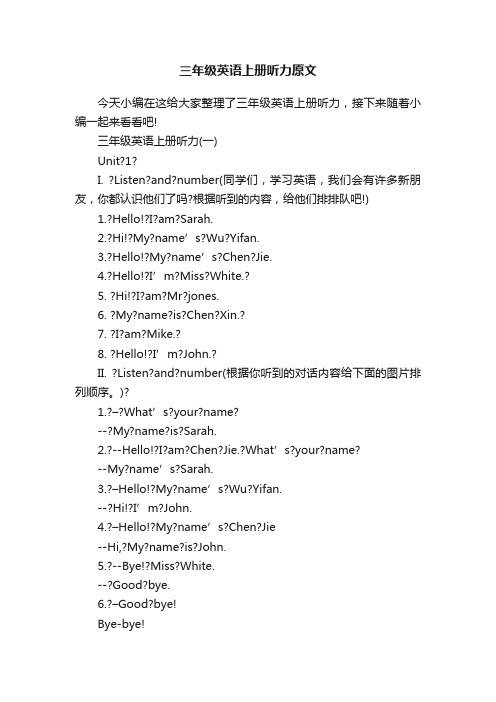
三年级英语上册听力原文今天小编在这给大家整理了三年级英语上册听力,接下来随着小编一起来看看吧!三年级英语上册听力(一)Unit?1?I. ?Listen?and?number(同学们,学习英语,我们会有许多新朋友,你都认识他们了吗?根据听到的内容,给他们排排队吧!)1.?Hello!?I?am?Sarah.2.?Hi!?My?name’s?Wu?Yifan.3.?Hello!?My?name’s?Chen?Jie.4.?Hello!?I’m?Miss?White.?5. ?Hi!?I?am?Mr?jones.6. ?My?name?is?Chen?Xin.?7. ?I?am?Mike.?8. ?Hello!?I’m?John.?II. ?Listen?and?number(根据你听到的对话内容给下面的图片排列顺序。
)?1.?–?What’s?your?name?--?My?name?is?Sarah.2.?--Hello!?I?am?Chen?Jie.?What’s?your?name?--My?name’s?Sarah.3.?–Hello!?My?name’s?Wu?Yifan.--?Hi!?I’m?John.4.?–Hello!?My?name’s?Chen?Jie--Hi,?My?name?is?John.5.?--Bye!?Miss?White.--?Good?bye.6.?–Good?bye!Bye-bye!7. ?Hello!?I’m?Miss?White.8. ?Hi!?I’m?Zoom.?III. ?Listen?and?tick.(你听到的内容与图片所表达的内容是否一致?一致用“√”表示,不一致用“X”表示)?1. ?Open?your?pencil?box.2. ?Show?me?your?eraser.?3. ?Close?your?bag.?4. Carry?your?bag.?5. I?have?a?ruler.?6. I?have?a?ruler,?too.?IV.?Listen?and?choose.(根据你听到的内容,选择恰当的图片,在其下面的括号中画“”?1.?I?have?a?pencil.2.?I?have?a?eraser.?3.?Hello!?My?name’s?Chen?Jie.?4.?Hi!?I?am?a?book.5.?I?have?a?bag.?7. ?I?have?ruler.?V.?Listen?and?chose.(认真听,将每组中你听到的正确的单词圈起来)?1.?I?have?a?book.2.?Hello!?My?name?is?―pencil‖.3.?I?have?a?pen.4.?I?have?a?bag.5.?I?have?eraser.6.?I?have?a?pencil?box.7.?I?have?a?ruler.8.?I?have?a?eraser,?too.三年级英语上册听力(二)Unit Two 第二单元Colours 颜色A: Let's paint! 我们来涂色吧!B: OK! 好吧!C: Good afternoon, Yifan. 下午好,一凡。
人教新起点六年级下学期英语听力原文材料
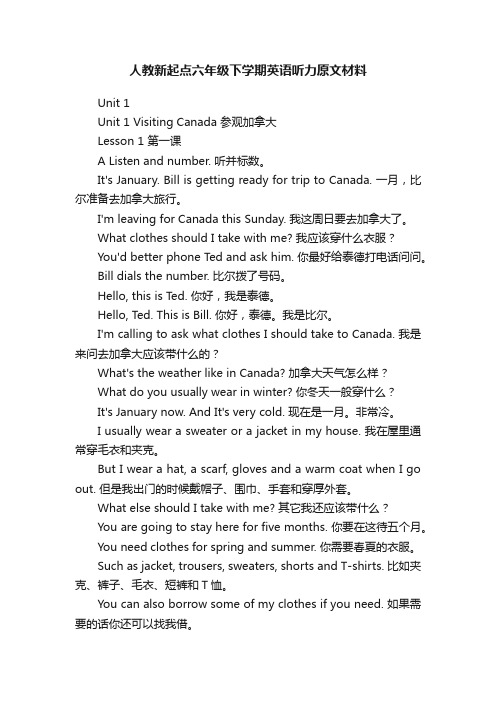
人教新起点六年级下学期英语听力原文材料Unit 1Unit 1 Visiting Canada 参观加拿大Lesson 1 第一课A Listen and number. 听并标数。
It's January. Bill is getting ready for trip to Canada. 一月,比尔准备去加拿大旅行。
I'm leaving for Canada this Sunday. 我这周日要去加拿大了。
What clothes should I take with me? 我应该穿什么衣服?You'd better phone Ted and ask him. 你最好给泰德打电话问问。
Bill dials the number. 比尔拨了号码。
Hello, this is Ted. 你好,我是泰德。
Hello, Ted. This is Bill. 你好,泰德。
我是比尔。
I'm calling to ask what clothes I should take to Canada. 我是来问去加拿大应该带什么的?What's the weather like in Canada? 加拿大天气怎么样?What do you usually wear in winter? 你冬天一般穿什么?It's January now. And It's very cold. 现在是一月。
非常冷。
I usually wear a sweater or a jacket in my house. 我在屋里通常穿毛衣和夹克。
But I wear a hat, a scarf, gloves and a warm coat when I go out. 但是我出门的时候戴帽子、围巾、手套和穿厚外套。
What else should I take with me? 其它我还应该带什么?You are going to stay here for five months. 你要在这待五个月。
新标准大学英语 视听说教程 听力原文及翻译
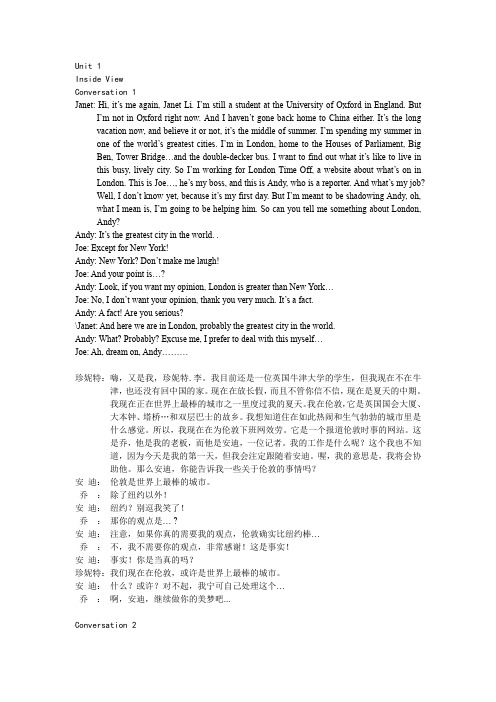
Unit 1Inside ViewConversation 1Janet: Hi, it’s me again, Janet Li. I’m still a student at the University of Oxford in England. But I’m not in Oxford right now. And I haven’t gone back home to China either. It’s the long vacation now, and believe it or not, it’s the middle of summer. I’m spending my summer in one of the world’s greatest cities. I’m in London, home to the Houses of Parliament, Big Ben, Tower Bridge…and the double-decker bus. I want to find out what it’s like to live in this busy, lively city. So I’m working for London Time Off, a website about what’s on in London. This is Joe…, he’s my boss, and this is Andy, who is a reporter. And what’s my job?Well, I don’t know yet, because it’s my first day. But I’m meant to be shadowing Andy, oh, what I mean is, I’m going to be helping him. So can you tell me something about London, Andy?Andy: It’s the greatest city in the world. .Joe: Except for New York!Andy: New York? Don’t make me laugh!Joe: And your point is…?Andy: Look, if you want my opinion, London is greater than New York…Joe: No, I don’t want your opinion, thank you very much. It’s a fact.Andy: A fact! Are you serious?\Janet: And here we are in London, probably the greatest city in the world.Andy: What? Probably? Excuse me, I prefer to deal with this myself…Joe: Ah, dream on, Andy………珍妮特:嗨,又是我,珍妮特.李。
人教新起点五年级下学期英语听力原文材料

人教新起点五年级下学期英语听力原文材料第一单元Lesson 1 第一课A Listen and number. 听并标数。
Tom, you're a little fat. 汤姆,你有点胖。
Do you often eat meat? 你经常吃肉吗?Yes, I often eat a lot of meat. 是的,我经常吃好多肉。
I like to eat candy, too. 我还喜欢吃糖。
That's bad for you. 那样对你不好。
You shouldn't eat too much meat. 你不该吃太多肉。
You should eat more vegetables and fruit. 你应该吃更多蔬菜和水果。
You also shouldn't eat too much candy. 你还不该吃太多糖。
Oh, I see. Thank you. 哦,我知道了。
谢谢。
Please do your homework, Bill. 做你的作业,比尔。
Sorry, Mum. I'm tired. 对不起,妈妈。
我很累了。
You are always tired. 你总是很累。
You should exercise every day and go to bed early. 你应该每天锻炼和早点睡觉。
Hi, Andy. What's your favourite drink? 嗨,安迪。
你最喜欢什么饮料?I really like juice, I like sweet things. 我喜欢喝果汁,我喜欢甜的东西。
I often drink a lot of juice. 我经常喝很多果汁。
You know? We shouldn't drink too much juice. 你知道吗?我们不该喝太多果汁。
It's not good for our teeth. 对我们的牙不好。
人教版新起点三年级下学期英语听力原文材料
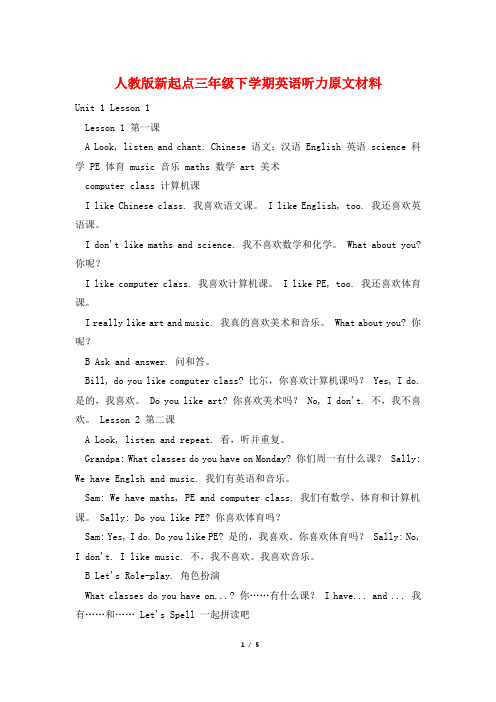
人教版新起点三年级下学期英语听力原文材料Unit 1 Lesson 1Lesson 1 第一课A Look, listen and chant. Chinese 语文;汉语 English 英语 science 科学 PE 体育 music 音乐 maths 数学 art 美术computer class 计算机课I like Chinese class. 我喜欢语文课。
I like English, too. 我还喜欢英语课。
I don't like maths and science. 我不喜欢数学和化学。
What about you? 你呢?I like computer class. 我喜欢计算机课。
I like PE, too. 我还喜欢体育课。
I really like art and music. 我真的喜欢美术和音乐。
What about you? 你呢?B Ask and answer. 问和答。
Bill, do you like computer class? 比尔,你喜欢计算机课吗? Yes, I do. 是的,我喜欢。
Do you like art? 你喜欢美术吗? No, I don't. 不,我不喜欢。
Lesson 2 第二课A Look, listen and repeat. 看,听并重复。
Grandpa: What classes do you have on Monday? 你们周一有什么课? Sally: We have Englsh and music. 我们有英语和音乐。
Sam: We have maths, PE and computer class. 我们有数学、体育和计算机课。
Sally: Do you like PE? 你喜欢体育吗?Sam: Yes, I do. Do you like PE? 是的,我喜欢。
你喜欢体育吗? Sally: No, I don't. I like music. 不,我不喜欢。
新概念青少版1b课后听力原文

对于学习英语的孩子们来说,新概念英语青少版1b课后听力原文是非常重要的学习资料。
在这本教材中,孩子们可以通过听力练习来提高他们的英语听力能力,同时也可以巩固课堂上所学的知识。
以下是新概念英语青少版1b课后听力原文的内容:1. Lesson 1Text:A: Excuse me, are you Mr. King?B: Yes, I am.A: Do you teach English?B: Yes, I do. I teach it at No. 15 Middle School.A: I’m a student at that school. I’m in Class 2, Grade 2.B: Oh, really?A: Yes, I’m very glad to meet you.B: Nice to meet you, too.2. Lesson 2Text:A: What’s your name?B: My name is Wang Fei.A: How old are you?B: I’m twelve. And you?A: I’m twelve, too.B: Are you in Class 4, Grade 1?A: No, I’m not. I’m in Class 2, Grade 2. What’s your phone number?B: It’s xxx.3. Lesson 3Text:A: Hello, my name’s M iss Green.B: How do you do? My name is Alice White.A: I like your name. Are you a new student here?B: No, I’m not. I’ve been here for two years. And you?A: I’ve been here for three years. Nice to meet you.B: Nice to meet you, too.4. Lesson 4Text:A: Good evening, Miss King.B: Good evening, Class 2.A: Sit down, please.B: Thank you, Miss King.以上就是新概念英语青少版1b课后听力原文的内容。
北师大版英语八年级上册听力原文及翻译
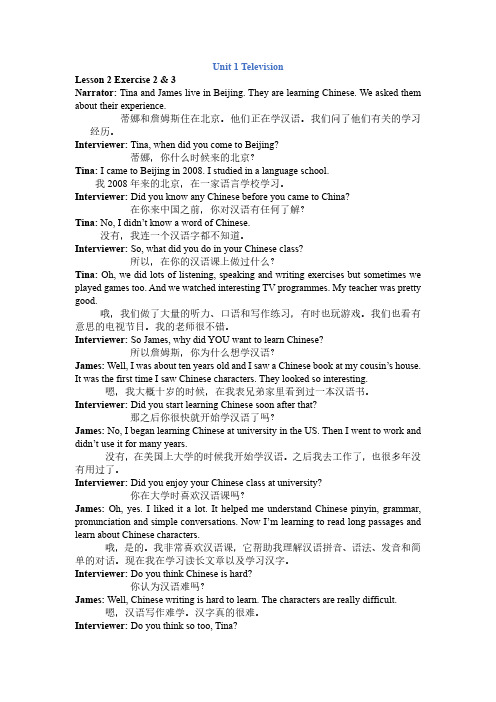
Unit 1 TelevisionLesson 2 Exercise 2 & 3Narrator: Tina and James live in Beijing. They are learning Chinese. We asked them about their experience.蒂娜和詹姆斯住在北京。
他们正在学汉语。
我们问了他们有关的学习经历。
Interviewer: Tina, when did you come to Beijing?蒂娜,你什么时候来的北京?Tina: I came to Beijing in 2008. I studied in a language school.我2008年来的北京,在一家语言学校学习。
Interviewer: Did you know any Chinese before you came to China?在你来中国之前,你对汉语有任何了解?Tina: No, I didn’t know a word of Chinese.没有,我连一个汉语字都不知道。
Interviewer: So, what did you do in your Chinese class?所以,在你的汉语课上做过什么?Tina: Oh, we did lots of listening, speaking and writing exercises but sometimes we played games too. And we watched interesting TV programmes. My teacher was pretty good.哦,我们做了大量的听力、口语和写作练习,有时也玩游戏。
我们也看有意思的电视节目。
我的老师很不错。
Interviewer: So James, why did YOU want to learn Chinese?所以詹姆斯,你为什么想学汉语?James: Well, I was about ten years old and I saw a Chinese book at my cousin’s house. It was the first time I saw Chinese characters. They looked so interesting.嗯,我大概十岁的时候,在我表兄弟家里看到过一本汉语书。
- 1、下载文档前请自行甄别文档内容的完整性,平台不提供额外的编辑、内容补充、找答案等附加服务。
- 2、"仅部分预览"的文档,不可在线预览部分如存在完整性等问题,可反馈申请退款(可完整预览的文档不适用该条件!)。
- 3、如文档侵犯您的权益,请联系客服反馈,我们会尽快为您处理(人工客服工作时间:9:00-18:30)。
Lesson OnePassage 1 American MusicOne of America's most important exports is her modern music. American music is played all over the world. It is enjoyed by people of all ages in every country. Although the lyrics are in English, people who don't speak English can enjoy it too. The reasons for its popularity are its fast pace and rhythmic beat.Music has many origins in the United States. Country music, coming from the rural areas in the southern United States, is one source. Count music features simple themes and melodies describing day-to-day situations and the feelings of country people. Many people appreciate this music because of the emotions expressed by country music songs.A second origin of American pop music is the blues. It depicts mostly sad feeling reflecting the difficult lives of American blacks. It is usually played and sung by black musicians, but it is popular with all Americans.Rock music is a newer form of music. This music style, featuring fast and repetitious rhythms, was influenced by the blues and country music. It was first known as rock-and-roll in the 1950s. Since then, there have been many forms of rock music: hard rock, soft rock and others. Many performers of rock music are young musicians.American pop music is marketed to a demanding audience. Now pop songs are heard on the radio several times a day. Some songs have become popular all over the world. People hear these songs sung in their original English or sometimes translated into other languages. The words may differ but the enjoyment of the music is universal.Passage 2 Music in Different CulturesIn western culture, music is regarded as good by birth, and sounds that are welcome are said to be "music to the ears". In some other cultures, for example, the lslamic culture, it is of little value, associated with sin and evil, In the West and in the high cultures of Asia, it is said that there are three types of music. First classical music, composed and performed by trained professionals originally under the support of courts and religious establishments; second, folk music, shared by the population at large and passed on orally; and third, popular music, performed by professionals, spread through radio, television, records, film, and print, and consumed by the mass public.Music is a major component in religious services, theater, and entertainment of all sorts. The most universal use of music is as a part of religious rituals. In some tribal societies, music appears to serve as a special form of communication with supernatural beings, and its prominent use in modern Christian and Jewish services may be the leftover of just such an original purpose. Another less obvious function of music is social adherence. For most social groups, music can serve as a powerful symbol. Members of most societies share keen feelings as to what kind of music they "belong to": Indeed, some minorities including, in the U.S.A., black Americans and Euro-American groups use music as a major symbol of group identity. Music also symbolizesmilitary, patriotic and funerary moods and events. In a more general sense, music may express fifes central social values of a society. In western culture, the interrelationship of conductor and orchestra symbolizes the need for strong cooperation among various kinds of specialists in a modern industrial society.Passage 3Music comes in many forms; many countries have a style of their own. Poland has its folk music. Hungary has its czardas. Argentina is famous for the tango. The U.S. is known for just a type of music that has gained worldwide popularity.Jazz is American's contribution to popular music. While classical music follows formal European tradition, jazz is a rather free form. It is full of energy, expressing the moods, interests, and emotions of the people. In the 1920s jazz sounded like America. And so it does today.The origins of jazz are as interesting as the music itself. Jazz was invented by black Americans, who were brought to the southern states as slaves. They were sold to farm owners and forced to work long hours in the cotton and tobacco fields. The work was hard and life was short, When a slaver died his friends and relatives would gather and carry the body to have a ceremony before they buried him.There was always a band with them. On the way to the ceremony, the band played slow solemn music suitable for the situation. But on the way home, the mood changed. Spirits lifted. Everyone was happy. Death had removed one of their members, but the living were glad to be alive. The band played happy music. This music made everyone want to dance. This was an early form of jazz.Music has always been important to African-Americans. The people, who were unwillingly brought to America from West Africa, had a rich musical tradition. In the fields, they made up work songs. Singing made the hard work go faster. And when they accepted Christianity, these songs became lovely spirituals, which have become an everlasting part of American music.Lesson TwoPassage 1 Holidays in Britain and the UsPeople in the US get a two-week paled vacation from their job every year. Most British people have four or five weeks paid holiday a year. Americans often complain that two weeks are not enough, especially when they hear about the longer holidays that Europeans enjoy. In addition, there are eight days in each European country, which are public holidays (the British call them Bank Holidays) and many of these fall on a Monday, giving people along weekend.What do people do in Britain and the US when they are on holidays? In the US, outdoor vacations are popular, for example, at the Grand Canyon, Yellowstone or other national parks and forests. Young people may go walking or camping in the mountains. Many people have small trailers in which to travel, or if they have a car, they may stay at motets on the journey, Disneyland and Disneyworld are also popular. In addition, people can go skiing in the RockyMountains of Colorado, Wyoming and Montana. Some children go to summer camp for a holiday during the summer vacation from school, where they do special activities, such as sports or crafts. When Americans want a holiday for fun in the sun, they usually go to Florida, Hawaii, Mexico or the Caribbean. They may go to Europe for culture, for example, to see art, plays, and places of historic interest.In Britain, many people like to go to the seaside for holidays. There are places near the sea, such as Black pool, Scarborough and Bournemouth, where there is plenty to do, even when it rains. People also like to go to the countryside, especially to walk, in places like Scotland, Wales and the Lake District. When the British go abroad they usually want to go somewhere warm. Spain and the Spanish islands of Majorea and Lbiza are popular, as are other places in southern Europe. For skiing, people often go to the Alps.Passage 2 Welcoming the New YearEvery country in the world celebrates New '(ear but not everyone does it on the same day. The countries of North and South America and Europe welcome the New Year on January l, This practice’ began with the Romans. Julius Caesar, a Raman ruler, changed the date of the New Year from the first day of March to the first day of January. In the Middle East, New Year is on the day when spring begins. People in China celebrate it on the Spring Festival, which is the first day of their lunar calendar. The Spring Festival usually comes between January 21 and February 19. Rosh Hashanah, which is the Jewish New Year, comes at the end of summer.In all of these cultures, there is a tradition of making noise. People made noise in ancient times to drive away the evil spirits from home. Today many people do it with fireworks. In Japan, people go from house to house making noise with drums and bamboo sticks. Young people in Denmark throw broken pieces of jars or pots against the sides of friends' houses.In the United States, many people stay up until midnight on New Year's Eve to watch the clock pass from one year to the next. Friends often gather together at a party on New Year's Eve, and when the New Year comes, all ring bells, blow horns, blow whistles, and kiss each other.In many European countries, families start the new year by first attending church service, which is followed by paying calls to friends and relatives. Italian boys and girls receive gifts of money on New Year's Day.New Year's Day is more joyful than Christmas in France and Scotland. In these countries Christmas is a religious holiday only, while the New Year is the time for gift-giving, parties, and visits.Passage 3 The Spring FestivalThe Spring Festival is the most important festival for the Chinese. It comes on the first day of the first month according to Chinese lunar calendar. It marks the beginning of a new year. It is also an occasion for family reunion. Family members and relatives get together to say goodbye to the old year and greet the new one. Guonian means "passing the year. People start preparingfor it half a month before it comes. They clean their houses thoroughly, decorate them and even paint them; they buy new clothes for children, and they prepare food for the big feast on the eve of the festival. On the eve of the festival, the whole extended family comes together for a big dinner. Dumplings are a must for this festival dinner in northern China, while for southerners niangao - a sticky sweet rice pudding - is the traditional food for this occasion. People stay up until midnight chatting, playing mahjong or watching TV. At the turn of the old and the New Year, people used to let off firecrackers to greet the arrival of the New Year, In the old days people believed setting off firecrackers could drive away the evil spirits. But now, people make phone calls or send messages on mobile phones to exchange New Year's greetings. Early in the morning, children greet their parents and are given Hongbao - cash tucked inside red envelopes. The Lantern Festival, on the 15th of the first month according to the lunar calendar, is considered the formal end of the Spring Festival. It is an occasion of lantern displays and folk dances everywhere. One typical food is Yuanxiao - dumplings made of sweet rice rolled into balls with all sorts of filling. The Spring Festival is a national holiday. For most people, it lasts seven days. In the past, people stayed with their families at home. Few traveled during the holiday. Nowadays things have changed.Lesson ThreePassage 1 World Trade OrganizationEstablished on January l, 1995, World Trade Organization is the successor to the General Agreement on Tariffs and Trade (GATT). It exists to promote a free-market international trade system. The WTO promotes trade by:1. reducing tariffs;2. prohibiting import or export bans or quotas;3. eliminating discrimination against foreign products and services;4. eliminating other impediments to trade, commonly called "non-tariff trade barriers".The WTO currently has 134 member countries, accounting for over 90% of world trade. Over 30 0thers are negotiating membership. The WTO's top level decision-making body is the ministerial conference which meets at least once ever3r two years, Over three-quarters of WTO members are developing countries. Special provisions for these members are included in the WTO agreements. GATT is now the WTO's principal rule book.Decisions are made by the entire membership by consensus or majority vote. The WTO's agreements have been ratified in all members' parliaments. If a trade barrier is found to be unfair, the WTO can authorize the imposition of trade sanctions to force a change in that country's law. The WTO exempts trade barriers which are designed to conserve natural resources or protect health.Critics say the WTO agreements are skewed in favor of rich countries. The West may preach trade liberalization, but it has used negotiations to prize third world markets while keeping its own barriers intact.Passage 2President Jiang Zemin said on November 16, 2000 that in the development of a “New Economy”, it is essential to take advantage of the latest developments in science and technology. He made this address at the eighth informal meeting of leaders of the APEC forum. He explained that the "New Economy" refers to the kind of economy initiated and sustained by new technologies and hi-tech industries. "The advancement of technology, led by IT and bio-technology industries, is giving rise to a new industrial revolution", Jiang said.Developing countries are faced with the difficult tasks of both transforming their traditional industries and developing new industries, Jiang noted, adding that the continued expansion of the "digital dude" has widened the wealth gap between North and South and may trigger new imbalances in the world economy."Against the background of accelerated economic globalization and the dynamic progress of science and technology, we must facilitate cooperation between developed and developing countries on exchanges of human resources, technology and infrastructure, and we must help countries develop independently to narrow the North-South gap.""Today, the development, application and impact of science and technology far transcend national boundaries. For example, every major breakthrough made in the human genome projects a crystallization of cooperation between scientists from a number of countries. Only when applied in a global context can the achievements of science and technology benefit people", Jiang said. He also noted that economic globalization should stress the popularization of scientific and technological knowledge.The protection of intellectual property rights should be guided by market rules in such a way that the rules will be helpful to the spread of scientific and technological knowledge, so that all countries may benefit, he added.Passage 3 The American Economic SystemAn important factor in a market-oriented economy is the mechanism by which consumer demands can be expressed and responded to by producers. In the American economy, this mechanism is provided by a price system, a process in which prices rise and fall in response to the relative demands of consumers and the supplies offered by seller-producers. If the product is in short supply relative to the demand, the price will be a bit up and some consumers will be eliminated from the market. If, on the other hand, producing more of a commodity results in reducing its cost, this will tend to increase the supply offered by seller-producers, which in turn will lower the price and permit more consumers to buy the product. Thus, price is the regulating mechanism in the American economic system.The important factor in an economy of private ownership is that individuals are allowed to own productive resources (private property), and they are permitted to hire labor, gain control over natural resources, and produce goods and sew ices for sale at a profit. In the Americaneconomy, the concept of private property embraces not only the ownership of productive resources but also certain rights, including the right to determine the price of a product or to make a free contract with another private individual.Lesson 4Passage 1 Higher Education in the United StatesSince 1945 more than one million students from all over the world have studied in the United States. In a recent single year, there were more than 150,000 foreign students who came to the United States' institutions of higher learning. They were welcomed and most were successful in their academic studies. Foreign students who study in the United States benefit a lot from the American educational system.Three developments that today's students are benefiting from started more than a century ago following the Civil War. The first of these was the rapid growth of technological and professional education to meet the urgent demands of a complex industrial and urban society. New schools of technology, engineering architecture, law and medicine flourished, The second was the provision for graduate study, such as what had long existed in France and Germany. Harvard and John Hopkins Universities quickly took the lead in this field, but the state universities did not lag far behind. The third was the increased provision for the education of women. This included the establishment of new women's colleges, such as Vassar, Wellesley and Smith, and the adoption of co-education in all the new state universities as well as in many private institutions.These developments, the growth of technological and professional education, the provision for graduate study, and the increased educational opportunities for women, began over a century ago following the end of the Civil War.Passage 2 Education in CanadaCanada's per capita spending on education is among the world's highest. All provinces have compulsory education laws requiring that students attend school until the age of fifteen or sixteen, Elementary education includes kindergarten through the eighth grade. Canada's bilingual and bicultural heritage has had, and continues to have, a profound effect on the educational system. Since 1985, the province of Ontario has maintained publicly funded Roman Catholic and French-Language schools from kindergarten through the twelfth grade in addition to the English-Language schools. Saskatchewan and Alberta also support separate Roman Catholic schools. Quebec Province maintains a dual school system - Protestant and Catholic, each has its own school board.Higher education in Canada is offered in a variety of forms, Entrance requirements vary from one province to another. The traditional universities offer three-year general degree programs and four-year honors degree programs emphasizing a specialization. Seven of the universities are French-speaking while the others are English. All the traditional universities areconcerned about the relationship between their curricula, the economy and society. Graduates in recent years have faced considerable difficulty in finding employment.The Canadian provinces maintain junior colleges, community colleges, and technical institutes. They provide a variety of courses, often short-term, that cater to individual interests. These include subjects of current events and calligraphy. Adult education has become increasingly oracular in Canada in recent years. Almost all institutions offer some adult education courses.Passage 3Millions of people are enrolled in evening adult education programs across America, Community colleges have become popular and their enrollments have increased rapidly. Large universities are offering more courses in the evenings for adult students. In this way, the demand for more education is being met. One reason for this is that many older people are changing their professions. They are looking for different careers. Another reason is that repair costs have increased, Adults are taking courses like plumbing and electrical repair. In this way they hope that the high costs for repairs can be avoided. Advanced technology is the most important factor for the rise in adult education. Engineers, teachers and business people are taking adult education classes. They have found that more education is needed to do their jobs well. Various courses are offered. Computers and business courses are taken by many adult students. Foreign languages, accounting and communication courses are also popular. Some students attend classes to earn degrees. Others take courses for the knowledge and skills that they can receive. The lives of many people have been enriched because of adult education.Lesson 5Passage 1 Housing Options in the United StatesFinding the right place to live in can help ensure a most rewarding experience in-the United States for international students. Depending on your situation: whether you are here alone or with a family, the duration of your stay, the amount of privacy you would like, anything from living on campus in a residence hall to private accommodation in a motel could suit your needs. As an ESL student, your housing may or may not be included in the study program. The basic choice to make is whether to live on or off campus. There are advantages and disadvantages to both.The advantages of living on campus are as follows: you will have a furnished room, easy access to campus facilities such as libraries, computer labs, sports facilities and cafeterias, access to social activities and peers, and maximum interaction with other students. Eating on campus is usually cheaper, and you don’t have to worry about transportation to and from classes. There are also some disadvantages. You may be sharing a bedroom with other students, so you will not have much privacy. You must be flexible when living with others.The advantages of living off campus are as follows: you will have privacy, more real worldexperiences, your own bathroom and kitchen facilities, and furnished rooms, It is possible to have visitors at any time and suitable for students with their families. However, there are some disadvantages. The rooms are not always furnished. Unless you are living with a host family, there is a lack of spontaneous social activities with people. And transportation is inconvenient. You may waste time rn transit to and from classes.Passage 2 Living on CampusAll students are required to live in the Residence Hall, which provides students with good opportunities to make friends, meet each other and enjoy a wonderful campus life. The Student Residence Hall is situated on the campus within short walking distance from the library, study rooms, computer science center and recreational facilities. Students will also have convenient access to the sea and other places of interest in the area. They will have quite a different life while walking along the beach, visiting places off-campus and looking for fun.At present, about 60 rooms are available and each accommodates 3 students. All rooms are fully furnished with bookshelves, cupboards, desks, one telephone, one TV and modern outlets.A shared washroom and bathroom are provided on each floor, and both have considerable facilities. There is a laundry with several washing machines on the first floor. Bedding is provided and each week a clean linen change will be arranged.A group of well-trained staff are responsible to see that all public areas are clean at all times. Security guards are always on watch on the first floor to answer questions and complaints and guarantee the safety of every resident.The Dining Hall is on the second floor of the building. Both students and the college faculty are encouraged to have meals in the College Dining Hall. Breakfast, lunch and supper are all offered and a great variety of nutritious and healthy Chinese foods also available.A small cafe is open everyday from 6:00 a.m. to 10:00 p.m. on the third floor. Here you can find a very romantic and elegant place for sampling western food, drinking coffee or other beverages and talking to friends. Both food and service are standard.Passage 3 Academic Levels and CreditsAcademic LevelsA first-year college or university student is commonly known as a "freshman", whereas "sophomore", "junio", and "senior" designate second-, third- and fourth-year students. Collectively, these students are called "undergraduates"; students in the first two years are called "underclassmen" and in the last two years "upperclassmen". Successful completion of four years of undergraduate study entitles the student to a bachelor's degree, which is the prerequisrte for admission to graduate school. Students who begin college studies in two-year colleges earn an associate's degree and may transfer to the appropriate level of a bachelor's degree program. CreditsUndergraduate academic progress in higher education in the United States is usuallymeasured in units called "credits", -credit hours", or "points". In schools on the semester system a credit is defined as one hour of classroom instruction, or two or three hours of laboratory experience per week for a semester. Most students normally take 15 0r 16 credits a semester, but some take 17 or 18.For instructions on the quarter system, a "quarter hour" of credit is defined in the same way, but based on the 10-week term as previously noted. Three quarter credits are therefore the equivalent of two semester credits and represent the same amount of academic accomplishment. The total number of credits taken in a term is often called the class load.Ordinarily 60 or 64 semester credits are required for a two-year associate degree and 120 to 128 credits for the four-year bachelors.。
